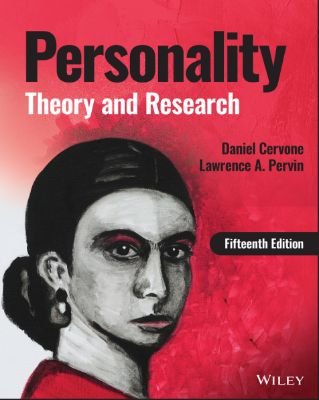Personality: Theory and Research

Lýsing:
A comprehensive and accessible approach to personality theory and research with a renewed focus on contemporary findings In the newly revised 15th edition of Personality: Theory and Research, a team of distinguished researchers delivers balanced and up-to-date coverage of the major theories of personality and the latest psychological research on the subject. The book offers consistent theory-by-theory discussions of personality structures, processes, and development and provides readers with a foundation to compare and relate each theory to the others.
New case simulations bridge the gap between theory and practice and a unique package of textbook features enables students to develop their critical thinking skills as they evaluate theories and research and consider their relevance to practical applications. The authors present thorough historical coverage of the development of personality research throughout the decades without omitting comprehensive analyses of contemporary research findings.
Readers will also find: Expanded coverage of the interplay between personality and culture, in which modern research findings challenge assumptions contained in 20th-century personality theories New content on the biological foundations of personality A brand-new modular format that offers instructors flexibility to cover personality theories in an order of their choosing Novel case simulations that deepen student understanding of theoretical concepts and enable them to relate principles of personality science to everyday life An essential text for undergraduate and advanced students of psychology and related fields, Personality: Theory and Research is also ideal for psychology professionals, researchers, and practitioners.
Annað
- Höfundur: Daniel Cervone, Lawrence A. Pervin
- Útgáfa:15
- Útgáfudagur: 2022-12-27
- Engar takmarkanir á útprentun
- Engar takmarkanir afritun
- Format:ePub
- ISBN 13: 9781119891635
- Print ISBN: 9781119891673
- ISBN 10: 1119891639
Efnisyfirlit
- Cover
- Title Page
- Copyright
- Dedication
- Preface
- 1 Personality Theory: From Observation to Scientific Explanation
- Questions to Be Addressed in This Chapter
- Defining Personality
- Three Goals for the Personality Theorist
- Answering Questions about Persons Scientifically: Understanding Structures, Processes, Development, and Therapeutic Change
- Important Issues in Personality Theory
- Evaluating Personality Theories
- The Personality Theories: An Introduction
- Major Concepts
- Review
- 2 The Scientific Study of People
- Questions to Be Addressed in This Chapter
- Personality Research: The Data
- Personality Research: Research Designs
- Contemporary Developments in Personality Research: Social Media and Language-Based Assessments
- Personality Assessment and the Case of Jim
- Vive la Différence: Conceptual Distinctions in Personality Research
- Major Concepts
- Review
- 3 A Psychodynamic Theory: Freud’s Psychoanalytic Theory of Personality
- Questions to Be Addressed in This Chapter
- Sigmund Freud (1856–1939): A View of the Theorist
- Freud’s View of the Person
- Freud’s View of the Science of Personality
- Freud’s Psychoanalytic Theory of Personality
- Major Concepts
- Review
- Note
- 4 Freud’s Psychoanalytic Theory: Applications, Related Theoretical Conceptions, and Contemporary Research
- Questions to Be Addressed in This Chapter
- Psychodynamic Personality Assessment: Projective Tests
- Psychopathology
- Psychological Change
- The Case of Jim
- Related Theoretical Conceptions
- Contemporary Developments in Personality Theory: Neuropsychoanalysis
- Critical Evaluation
- Major Concepts
- Review
- 5 A Phenomenological Theory: The Personality Theory of Rogers
- Questions to Be Addressed in This Chapter
- Carl R. Rogers (1902–1987): A View of the Theorist
- Rogers’s View of the Person
- Rogers’s View of the Science of Personality
- The Personality Theory of Carl Rogers
- Major Concepts
- Review
- 6 Rogers’s Phenomenological Theory: Applications, Related Theoretical Conceptions, and Contemporary Research
- Questions to Be Addressed in This Chapter
- Clinical Applications
- The Case of Jim
- Related Conceptions: Human Potential, Positive Psychology, and Existentialism
- Developments in Research: The Self and Authenticity
- Contemporary Developments in Personality Theory: Personality Systems Interaction Theory and the Integrated Self
- Personality Systems Interaction Theory
- Illustrative Research
- Implications for Rogers’s Self Theory of Personality
- Critical Evaluation
- Major Concepts
- Review
- Note
- 7 Trait Theories of Personality: Allport, Eysenck, and Cattell
- Questions to Be Addressed in This Chapter
- A View of the Trait Theorists
- Trait Theory’s View of the Person
- Trait Theory’s View of the Science of Personality
- Trait Theories of Personality: Basic Perspectives Shared by Trait Theorists
- The Trait Theory of Gordon W. Allport (1897–1967)
- Identifying Primary Trait Dimensions: Factor Analysis
- The Factor-Analytic Trait Theory of Raymond B. Cattell (1905–1998)
- The Three-Factor Theory of Hans J. Eysenck (1916–1997)
- Major Concepts
- Review
- 8 Trait Theory: The Five-Factor Model and Contemporary Developments
- Questions to Be Addressed in This Chapter
- On Taxonomies of Personality
- The Five-Factor Model of Personality: Research Evidence
- Five-Factor Theory
- Maybe We Missed One? The Six-Factor Model
- Cross-Cultural Research: Are the Big Five Dimensions Universal?
- Contemporary Developments in Trait Theory: Reinforcement Sensitivity Theory
- The Case of Jim—Factor-Analytic Trait-Based Assessment
- The Person–Situation Controversy
- Critical Evaluation
- Major Concepts
- Review
- 9 Behaviorism and The Learning Approaches to Personality
- Questions to Be Addressed in This Chapter
- Behaviorism’s View of the Person
- Behaviorism’s View of the Science of Personality
- Watson, Pavlov, and Classical Conditioning
- Skinner’s Theory of Operant Conditioning
- Critical Evaluation
- Major Concepts
- Review
- 10 A Cognitive Theory: George A. Kelly’s Personal Construct Theory of Personality
- Questions to Be Addressed in This Chapter
- George A. Kelly (1905–1966): A View of the Theorist
- Kelly’s View of the Science of Personality
- Kelly’s View of the Person
- The Personality Theory of George A. Kelly
- Clinical Applications
- The Case of Jim
- Related Points of View and Recent Developments
- Critical Evaluation
- Major Concepts
- Review
- Note
- 11 Social-Cognitive Theory: Bandura and Mischel
- Questions to Be Addressed in This Chapter
- Relating Social-Cognitive Theory to Historically Prior Theories
- A View of the Theorists
- Social-Cognitive Theory’s View of the Person
- Social-Cognitive Theory’s View of the Science of Personality
- Social-Cognitive Theory of Personality: Structure
- Social-Cognitive Theory of Personality: Process
- Social-Cognitive Theory of Growth and Development
- Major Concepts
- Review
- 12 Social-Cognitive Theory: Applications, Related Theoretical Conceptions, and Contemporary Developments
- Questions to Be Addressed in This Chapter
- Beliefs About the Self and Self-Schemas
- Standards of Evaluation and Self-Discrepancies
- Contemporary Developments in Personality Theory: The KAPA Model
- Clinical Applications
- Stress, Coping, and Cognitive Therapy
- The Case of Jim
- Critical Evaluation
- Major Concepts
- Review
- 13 Culture, Interpersonal Relations, and the Social Foundations of Personality and Its Development
- Questions to Be Addressed in This chapter
- Persons in Cultures
- Broad Cultural Differences: Western and Eastern Views of Self
- Societies within Cultures: Social Practices and Personality Development
- Personality Development in Socioeconomic Context
- Personality Functioning Across the Life Span
- Interpersonal Relationships
- Putting Personality in Context into Practice
- Summary
- Major Concepts
- Review
- Note
- 14 Genes, Brains, and Biological Bases of Personality and its Development
- Questions to Be Addressed in This Chapter
- Temperament
- Evolution, Evolutionary Psychology, and Personality
- Mood, Emotion, and the Brain
- Plasticity: Biology as Both Cause and Effect
- Neuroscientific Investigations of “Higher-Level” Psychological Functions
- Summary
- Major Concepts
- Review
- 15 Assessing Personality Theory and Research
- Questions to Be Addressed in This Chapter
- The Personality Theories: Similarities, Differences, and Integration
- What an Integrative Theory Might Look Like
- How Did They Do? A Critical Evaluation of the Personality Theories and Their Research
- A Final Summing Up: Theories as Toolkits
- Review
- Glossary
- References
- Author Index
- Subject Index
- End User License Agreement
UM RAFBÆKUR Á HEIMKAUP.IS
Bókahillan þín er þitt svæði og þar eru bækurnar þínar geymdar. Þú kemst í bókahilluna þína hvar og hvenær sem er í tölvu eða snjalltæki. Einfalt og þægilegt!Rafbók til eignar
Rafbók til eignar þarf að hlaða niður á þau tæki sem þú vilt nota innan eins árs frá því bókin er keypt.
Þú kemst í bækurnar hvar sem er
Þú getur nálgast allar raf(skóla)bækurnar þínar á einu augabragði, hvar og hvenær sem er í bókahillunni þinni. Engin taska, enginn kyndill og ekkert vesen (hvað þá yfirvigt).
Auðvelt að fletta og leita
Þú getur flakkað milli síðna og kafla eins og þér hentar best og farið beint í ákveðna kafla úr efnisyfirlitinu. Í leitinni finnur þú orð, kafla eða síður í einum smelli.
Glósur og yfirstrikanir
Þú getur auðkennt textabrot með mismunandi litum og skrifað glósur að vild í rafbókina. Þú getur jafnvel séð glósur og yfirstrikanir hjá bekkjarsystkinum og kennara ef þeir leyfa það. Allt á einum stað.
Hvað viltu sjá? / Þú ræður hvernig síðan lítur út
Þú lagar síðuna að þínum þörfum. Stækkaðu eða minnkaðu myndir og texta með multi-level zoom til að sjá síðuna eins og þér hentar best í þínu námi.
Fleiri góðir kostir
- Þú getur prentað síður úr bókinni (innan þeirra marka sem útgefandinn setur)
- Möguleiki á tengingu við annað stafrænt og gagnvirkt efni, svo sem myndbönd eða spurningar úr efninu
- Auðvelt að afrita og líma efni/texta fyrir t.d. heimaverkefni eða ritgerðir
- Styður tækni sem hjálpar nemendum með sjón- eða heyrnarskerðingu
- Gerð : 208
- Höfundur : 18449
- Útgáfuár : 2022
- Leyfi : 380


